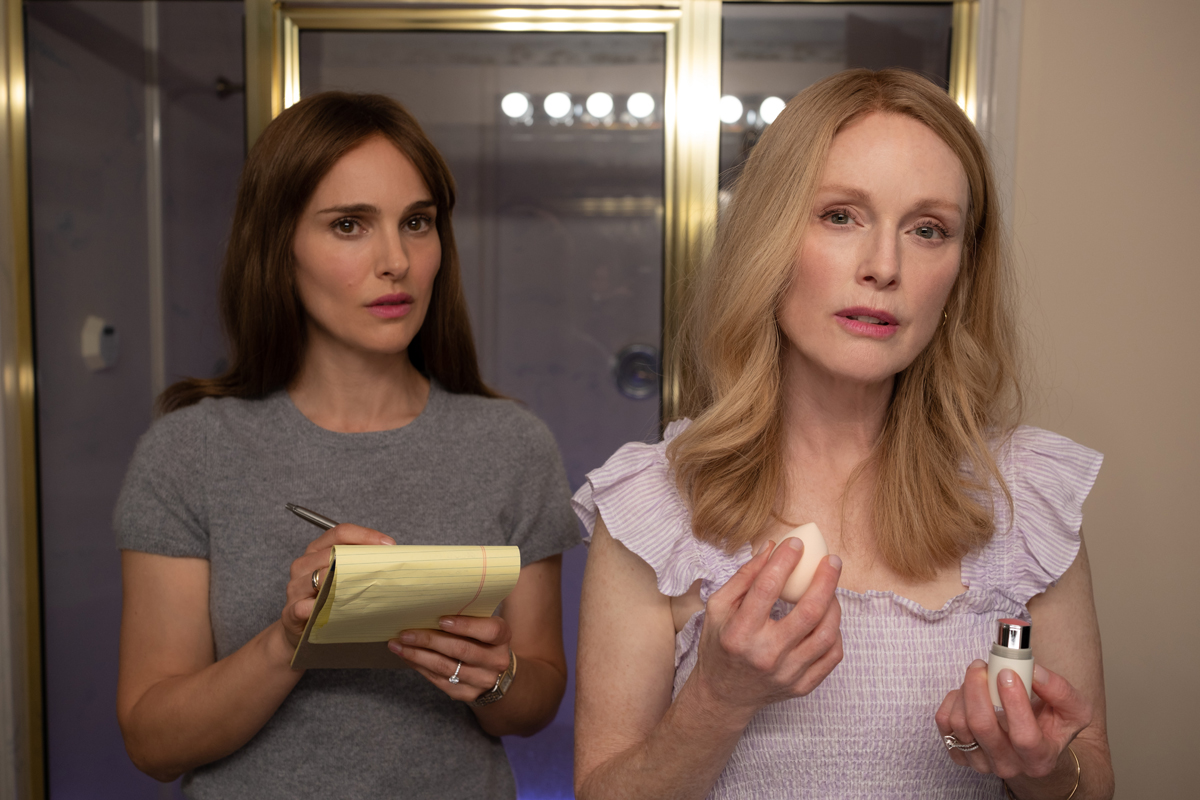 Melissa Anderson
Melissa Anderson
Moleskine Notes on a Scandal: in the latest film by Todd Haynes, one woman’s past is another woman’s future.

Natalie Portman as Elizabeth Berry and Julianne Moore as Gracie Atherton-Yoo in May December. Courtesy Netflix. Photo: Francois Duhamel.
May December, directed by Todd Haynes, opening in select select theaters November 17, 2023
• • •
An actor prepares. That simple declarative sentence is the name of the most enduring book on acting techniques, written by the Russian theater titan Konstantin Stanislavski and published in English in 1936; it has served as the foundational text of Method training and remains a crucial guide to aspiring thespians today. But the stark title has more than a hint of bellicosity about it. Those three words suggest that actors are aggressors, girding themselves for war, for battle—for blood. The savagery of acting—its deceits, expediency, manipulation—is just one theme in Todd Haynes’s piquant, immensely pleasurable May December, a film that also intelligently explores gendered role-playing and our culture’s seemingly unslakable appetite for lurid scandals, to be repackaged as “true-crime content” in perpetuity.

Elizabeth Yu as Mary Atherton-Yoo, Natalie Portman as Elizabeth Berry, and Julianne Moore as Gracie Atherton-Yoo in May December. Courtesy Netflix.
With a deft script by Samy Burch (this is, remarkably, her first feature-length screenplay), the film takes place over a few late-spring weeks in 2015 and is set in motion by the arrival of an outsider. Juilliard-educated actress Elizabeth Berry (Natalie Portman)—best known for playing the lead in a TV drama about a veterinarian with the dismal title Norah’s Ark—has come to Savannah, Georgia to do research for a role in an independent film that she is confident will demonstrate her legitimacy as a serious performer. The part is juicy: she will play a woman who, more than two decades ago, began a sexual relationship with a thirteen-year-old boy when she was thirty-six, a crime that led to her imprisonment and relentless tabloid attention. That age-discordant couple—Gracie Atherton-Yoo (Julianne Moore) and Joe Yoo (Charles Melton)—is still together, long-wedded and the parents of three kids, living in snug domesticity in Savannah, whose residents seem to have largely forgiven them for the infamy they brought on the town. (Gracie and Joe’s union and its ensuing ignominy loosely follow the template of the real-life Mary Kay Letourneau, a teacher who began an affair in 1996 with her sixth-grade student Vili Fualaau.)

Julianne Moore as Gracie Atherton-Yoo and Charles Melton as Joe Yoo in May December. Courtesy Netflix.
Gracie has agreed to let Elizabeth shadow her at home and to interview anyone affiliated with the sordid episode, an offer made with more than a little trepidation: “I told you what happened when I met Judge Judy,” the matriarch remarks to a friend as she anxiously awaits her celebrity guest. During their initial encounter—at a Memorial Day barbecue hosted by the Yoos—Elizabeth attempts to put Gracie at ease with strenuous displays of false humility and deference, assuring the older woman of her lofty intentions: “I want you to feel seen and known.” That vacuous therapy-speak is soon followed by Elizabeth pacing Gracie and Joe’s backyard, furiously scribbling in a Moleskine—a cunning ethnologist of emotions taking field notes, extracting details from imperfect humans, data that she will distort in her pursuit of another cliché, “artistic truth.”

Charles Melton as Joe Yoo in May December. Courtesy Netflix. Photo: Francois Duhamel.
Elizabeth isn’t the only one acting. As she spends more time with Gracie, it becomes clearer that the one-time pariah has spent most of her life performing helplessness, a type of toxic femininity that insists women are to be protected by men and, by perverse extension, are powerless against succumbing to male desire. “Who was in charge? Who was the boss?” Gracie, weeping, scolds Joe one night in their bedroom when he dares to raise the possibility that maybe she should have exercised better judgment before having sex with a middle schooler.

Julianne Moore as Gracie Atherton-Yoo and Natalie Portman as Elizabeth Berry in May December. Courtesy Netflix. Photo: Francois Duhamel.
To enhance her vulnerability, Gracie will sometimes speak with a slight lisp, her voice pitched slightly higher than normal—self-infantilizing tics that Elizabeth immediately picks up on and will amplify when the cameras of the film-within-the-film start rolling. During her fortnight in Savannah, the actress will even start to resemble the woman she’s playing, Elizabeth’s severe all-black ensembles and blunt fringe soon supplanted by the pastels and softer side-part favored by Gracie. That gradual merging recalls Ingmar Bergman’s Persona (1966), another film about a complex relationship between two women, one of whom is an actress, which Haynes has readily acknowledged as a lodestar for May December.

Julianne Moore as Gracie Atherton-Yoo and Natalie Portman as Elizabeth Berry in May December. Courtesy Netflix. Photo: Francois Duhamel.
The connections between the two films are worth pointing out; May December’s reflection of Persona is just one aspect of the later project’s interest in mirrors, whether literal (glass surfaces abound) or figurative. Bergman’s superlative movie, which he once referred to as “a sonata for two instruments,” stars Liv Ullmann, at the time an up-and-coming actress, as Elisabet, a stage performer who has suffered some kind of psychic breakdown and is being cared for by a cheerful nurse named Alma, played by Bibi Andersson, by then a long-standing member of the Swedish director’s troupe. (Analogously, Moore and Haynes have made five films together to date, their collaboration beginning with 1995’s Safe.) Elisabet gives the appearance of being deeply interested in and empathetic to Alma, as Portman’s nearly identically named Elizabeth does with Gracie; in both Persona and May December, a purloined letter signals a wounding betrayal.

Natalie Portman as Elizabeth Berry and Julianne Moore as Gracie Atherton-Yoo in May December. Courtesy Netflix.
Yet Haynes’s film is more than just a mesmerizing homage to a canonical work (Persona’s other sterling descendants include David Lynch’s Mulholland Drive from 2001 and Olivier Assayas’s Clouds of Sils Maria from 2014). One of the thrills of expertly executed movies about performing is the ontological free fall that they catalyze. In May December, the mise en abyme set up by Portman’s central role provides an especially dizzying rush: a real-life A-lister playing an insecure TV actress who is readying herself to star in a tawdry biopic that she is certain will elevate her career. Augmenting Portman’s meta-performance in Haynes’s movie is her own filmography; it’s difficult not to think of the actress’s bizarrely narcotized, fatiguingly affected portrayal of Jacqueline Kennedy in the 2016 biopic Jackie when watching Elizabeth shooting a risible scene depicting a turning point in Gracie and Joe’s relationship.
A quicksilver film about the hazards and harms of role-playing—personally and/or professionally—May December also slyly calls into question why there would even be an interest in recycling the Gracie–Joe saga anew (as part of her research, Elizabeth watches an earlier movie about the scandal). The year that May December takes place roughly coincides with the beginning of the nonstop glut of podcasts, straight-to-streaming documentaries, and other media devoted to a vast array of human misery: serial killers, deranged cultists, one-time luminaries who met grim ends, sex offenders. What is the appeal of these tales of degradation? Answering the skepticism of the Yoos’ college-age daughter, Elizabeth assures the young woman that the project she’s starring in, one that recapitulates the most wretched moments in Gracie and Joe’s life together, will “capture something true.” Capture: a verb more evocative of violence than prepare.
Melissa Anderson is the film editor of 4Columns and the author of a monograph on David Lynch’s Inland Empire from Fireflies Press.